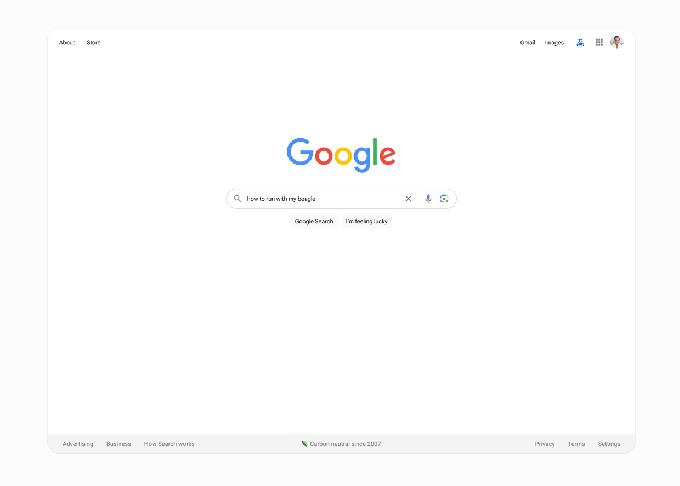Published on
November 16, 2023
Written by
Susant Swain
Google’s AI-powered search experience is rolling out worldwide, after initial launches in select markets, including the U.S., India and Japan. Starting today, the AI-based conversational experience known as SGE, or Search Generative Experience, will be available in mor than 120 new countries and territories, globally. It will also support four new languages: Spanish, Portuguese, Korean and Indonesian.
These join other supported languages, including English, Hindi and Japanese. In addition, SGE will see other minor improvements, starting in the U.S., in terms of asking follow-up questions and using features like translations and definitions.
Launched earlier this year, SGE is Google’s answer to Bing Chat, the OpenAI-powered AI chatbot experience available through Bing search and Microsoft’s Edge browser. Similar to Bing Chat, SGE lets web users interact with an AI using natural language. Users can ask questions and receive responses that aren’t just a list of links, as Google has historically offered, but are fully formed answers delivered in complete sentences, with references cited.
The experience has been steadily updated with new features following its arrival, excluding AI-powered summaries of paywalled articles, definitions of terms you may not be familiar with in certain subjects (like STEM, economics, history and others), improvements to its coding-related answers, as well as the ability to generate images and write drafts, among other things. It also recently opened up to U.S. teens, ages 13-17.
Today, in addition to the global expansion, Google will begin testing a new way for users to ask follow-up questions directly on the search results page. Now, as you explore a topic, you’ll be able to see your prior questions and search results, including Search ads in dedicated slots throughout the page, Google says. The company is positioning this as an easier way to dive deeper into a topic, but it’s also about making sure its ads business stays relevant in the AI-powered search era.

Image Credits: Google
This update will arrive first in the U.S. in English in the weeks ahead.
Another improvement is coming to SGE’s translation feature. When you ask Search to translate a phrase where some words could have more than one possible meaning, you can tap on those words and pick the meaning that relates to what it is you want to say. This option may also appear when you need to specify the gender for a particular word.

This feature will initially come to U.S. users for English-to-Spanish translations in the weeks ahead, and more countries will be added in the future.
Another small tweak involves the newly added definitions feature that allows users to ask for definitions of unfamiliar words found in answers about select educational topics in their AI-powered overviews. Now, in addition to science, economics and history, you can ask for definitions in areas like coding and health information. When available, these words will be highlighted, so you can hover over them to preview the definition and related images.
This option will arrive over the next month in English in the U.S. with more countries to follow.
“We’re at the beginning of a long arc of innovation, and we’re excited by the progress so far,” Hema Budaraju, Google’s senior director of Product Management for Search, tells TechCrunch. “Now, even more people around the world can use generative AI in Search for everyday help and we look forward to expanding to even more countries in the future.”
For reference, the full list of countries and territories that now have access to SGE includes the following:
- American Samoa
- Angola
- Antigua and Barbuda
- Bahamas
- Bangladesh
- Barbados
- Belize
- Benin
- Bhutan
- Bolivia
- Botswana
- Brazil
- Brunei
- Burkina Faso
- Burundi
- Cambodia
- Cameroon
- Cape Verde
- Central African Republic
- Chad
- Chile
- Colombia
- Comoros
- Congo [DRC]
- Congo [Republic]
- Cook Islands
- Costa Rica
- Côte d’Ivoire
- Dominica
- Dominican Republic
- Ecuador
- El Salvador
- Equatorial Guinea
- Eritrea
- Eswatini
- Ethiopia
- Fiji
- French Guiana
- Gabon
- Gambia
- Ghana
- Grenada
- Guadeloupe
- Guam
- Guatemala
- Guinea
- Guinea-Bissau
- Guyana
- Haiti
- Honduras
- Indonesia
- Jamaica
- Kenya
- Kiribati
- Kyrgyzstan
- Laos
- Lesotho
- Liberia
- Madagascar
- Malawi
- Malaysia
- Maldives
- Mali
- Marshall Islands
- Mauritius
- Mexico
- Micronesia
- Mongolia
- Mozambique
- Myanmar
- Namibia
- Nauru
- Nepal
- New Zealand
- Nicaragua
- Niger
- Nigeria
- Niue
- Northern Mariana Islands
- Pakistan
- Palau
- Panama
- Papua New Guinea
- Paraguay
- Peru
- Philippines
- Puerto Rico
- Rwanda
- Saint Kitts and Nevis
- Saint Lucia
- Saint Vincent and the Grenadines
- Samoa
- São Tomé and Príncipe
- Senegal
- Seychelles
- Sierra Leone
- Singapore
- Solomon Islands
- Somalia
- South Africa
- South Korea
- South Sudan
- Sri Lanka
- Suriname
- Taiwan
- Tajikistan
- Tanzania
- Thailand
- Timor-Leste
- Togo
- Tokelau
- Tonga
- Trinidad and Tobago
- Turkmenistan
- Tuvalu
- U.S. Virgin Islands
- Uganda
- United States Minor Outlying Islands
- Uruguay
- Uzbekistan
- Vanuatu
- Venezuela
- Vietnam
- Western Sahara
- Zambia
- Zimbabwe
Correction, 11/9/23, 10:14 am et: An earlier version of this story indicated Google’s AI would summarize paywalled articles, it excludes those from the feature.


